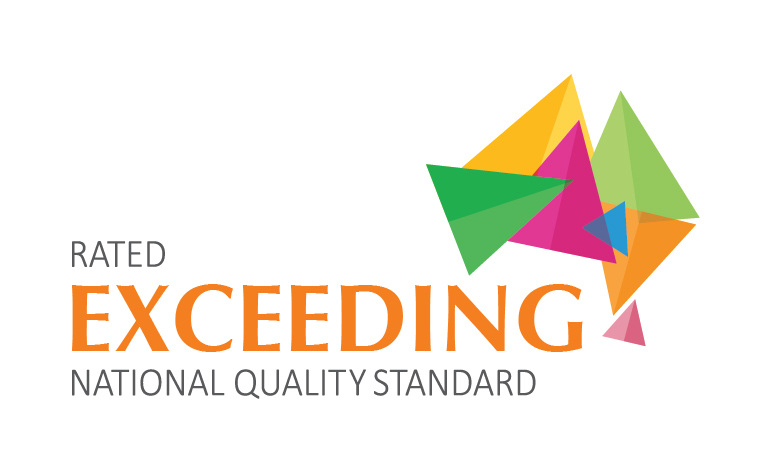At Little Darlings Child Care Centre we believe in providing children with the highest quality of care allowing each and every child to reach their fullest potential, by enhancing all areas of growth and development, in a warm caring and home like environment that is a reflection of our children, families and our community.
We strive to do this through providing a highly positive environment where all members such as staff, children, families etc are made to feel welcome and are considered to share an important place within the centre /community regardless of gender, race, culture or religious belief.
The service is dedicated to reflecting the principles that underpin the national law act and National Regulations by educating staff and families of the law and also to implement the early years learning framework. The service is committed to working within the national quality standards and implementation of our quality improvement plan.
THE EARLY YEARS LEARNING FRAMEWORK
We at Little Darlings Child Care Centre recognise children as unique individuals and aim to enhance all areas of development. Staff will therefore provide an individualized program, which caters for children according to their age and stage of development and aim to meet the 5 learning outcomes in a form of a process and journey rather than focusing on the end result.
Each child’s current knowledge, ideas, culture, abilities and interests are the foundation of the program and child’s documentation on learning and progress is made available to families. Every child is supported to participate in the program where each child’s agency is promoted, enabling them to make choices and decisions and influence events and their world, therefore children are active participants in their learning.
This is implemented by responding to children’s ideas and play and the use of intentional teaching to scaffold and extend each child’s learning. Educators will provide learning environments that are flexible and open ended, plan learning environments with appropriate levels of challenge, where children are encouraged to explore experiment and take appropriate risks in their learning.
The programme offers choice as well as a balance of structured / unstructured activities, outdoor / indoor experiences, quiet /noisy, music play, story time, multicultural, drama play and routines are organized in ways that maximize child’s learning.
The programme promotes play as this emphasises learning through a process of exploring, problem solving, social interaction, role play, communicating, and most important listening to children which enables children to enhance skills In areas such as their language, self help, cognitive, social interaction and fine / gross motor skills.
We value the importance of play because it is through play that children have fun , enjoy themselves and are able to express and let their creative side out. Play is important as it allows children to make decisions in a world dominated by adults which results in a happy and confident child that has a positive self image of oneself. Play is a way that children are able to learn and investigate the world and also further their development in a fun way , this provides the child with a sense of power.
Play is an important part of the early years learning framework which is connected with our philosophy. It is through play that children feel a sense of belonging , being and becoming. It is through quality educator and child interactions that allow for quality programs to be established that reflect childrens interest as well as further learning.
The term pedagogy refers to the holistic nature of early child hood educators’ professional practice (especially those aspects that involve building and nurturing relationships) curriculum decision making teaching and learning. When educators establish respectful and caring relationships with children and families, they are able to work together to construct curriculum and learning experiences relevant to children in their local context. These experiences gradually expand children’s knowledge and understanding of the world.
The program ensures the following 5 outcomes are achieved with children through the program, routine and the day.These include:
• Children have a strong sense of identity
• Children are connected and contribute to our world
• Children have a strong sense of wellbeing
• Children are confident and involved learners
• Children are effective communicators
The above outcomes are achieved through the set principles are used to assist children to achieve the learning outcomes. These include:
• Secure respectful and reciprocal relationships
• Partnerships
• High expectations and equity
• Respect for diversity
• Ongoing learning and reflective practice.
Various practice is used by educators to promote children’s learning. These include:
• Adopting holistic approaches
• Being responsive to children
• Planning and implementing learning through play
• Intentional teaching
• Creating physical and social learning environments that have a positive Impact on children’s learning
• Valuing the cultural and social contexts of children and their families
• Providing for continuity in experiences and enabling children to have successful transition
• Assessing and monitoring children’s learning to inform provision and to support children in achieving learning outcomes.
Critical reflection on children’s learning and development ,both as individuals and in groups is regularly used to implement the program.
Each child’s learning and development is assessed as part of an ongoing cycle of planning, documenting and evaluation.
The program ensures that decision making contributes to each child’s learning and development outcomes in relation to their identity, connection with community, wellbeing, confidence as learners and effectiveness as communicators. The philosophy guides pedagogy and teaching decisions, learning outcomes are communicated to families.
FAMILIES AND THE COMMUNITY
We as educators and carers work with families to understand the child and create their play situations as well as listening to the child to meet their needs and interests through play. “Play is a means by which the child comes to discover the world, it is the activity which builds self fulfilment” (Educating young children by Logan and Logan).
Working in partnerships with families, educators using the learning outcomes to guide their planning for children’s learning. In order to engage children actively in learning, educators identify children’s strengths and interest, choose appropriate teaching and strategies and design the learning environment, Educators assess learning to inform further planning (Framework, p9).
A reliable routine is put in place, which is provided in a home like environment that meets each and every child’s needs. Children will warm to a consistent and familiar service making them feel secure. The development of strong relationships between Educators and Families as well as parent involvement within the centre, maintains a high quality of care within the service. This enables children’s needs to be met more effectively, through the exchange of information about the child. This strong relationship between parents and Educators facilitates teamwork and open communication which maintains consistent care from the home environment to the centre environment. The children feel safe and secure because of this. Parents are encouraged to be involved within the centre in ways they feel comfortable. Family involvement allows for family identity culture and heritage backgrounds to be implemented within our service environment that shapes our community. This enables the process of belonging, being and becoming.
The service has full commitment to the participation of children with additional needs. Interactions are important to ensure the child feels a sense of belonging in the curriculum the routine offers for opportunities for 1-1 and small group experiences.
The service promotes Equity and inclusion.
Parents will be kept up to date and informed of their child’s day, centres policies and procedures or any changes regularly through meetings, newsletters and notice boards. The centres policies will be displayed for the parents view.
EDUCATORS
Educators respect the multiple cultural ways of knowing, seeing , living and celebrate the benefits of diversity and honour differences.
All decisions are made and stem from our philosophy that affect the children, families, staff, curriculum and community by
Always referring to our philosophy .
Educators are encouraged to work as a team supporting each other with open communication, motivation and acquiring new skills through workshops / in services. The experience gained will benefit children within their care. Educators ensure an ongoing cycle of review of current practices are examined , outcomes reviewed and ideas generated, this occurs on a daily basis to ensure a quality environment that focuses on the journey not the final outcome.
Educator interactions with children aim to give high praise of efforts, encouragement to help develop children’s self confidence, self-esteem and independence.
SUSTAINABILITY
The service is committed to sustainable practices within the service such as recycling energy efficiency and water conservation which are embedded into the daily routines and practice of service. our curriculum will engage children in planned experiences that engage them in appropriate sustainability practices within the service, educators will also provide children with access to information about the environment and the impact of human activities into the environment
Educators will also encourage respect for the natural environment and the interdependence between people, plants animals and the land.
The centre also has spaces that encourage development of life skills such as our planting boxes worm farm waste reduction and recycling
The service is committed to providing quality experiences in both indoor and outdoor environments
HEALTH WELL BEING AND POSITIVE IDENTITY
We believe each child’s health, security and well being underpins all learning experiences. We will promote exercise, good nutrition, sleep and rest periods. We will ensure each child feels love, security and a sense of belonging. Our outdoor and indoor areas engage every child in experiences which promote play and learning through stimulation of the senses in built and natural environments.
At little darlings we will endeavour to build upon the child’s self image, independence, belief in oneself and confidence in their well-being by fostering in each child a positive approach to their identity, with a sense of responsibility, self-discipline and self-esteem.
We will scaffold the education of development of each child as an individual who can grow his/her separate identity and qualities, yet still work and contribute constructively within a large group.
We ensure that our observed and discussed approach to supporting and promoting children’s health and physical activity consistently aligns with the design and delivery of the educational program and service philosophy and demonstrates strong commitment to the priorities, principles and practice of the approved learning framework 2.1.3
We ensure we reflect children’s changing health needs influence the design of the program we also are committed to being a munch and move and sun safety approved centre 2.1.3
We are respectful of differing cultural contexts of families of families and the community that impact perspectives about child safety and protection , while ensuring that practice decisions always reflect best practice approach.
AUSTRALIAN, ABORIGINAL AND TORRES STRAIT ISLANDER CULTURES ARE VALUED
Little Darlings acknowledges the traditional owners and custodians of the many lands across Australia.
We acknowledge our shared histories and the contributions of Aboriginal and Torres Strait Islanders peoples, who we recognize as being the first national people of Australia. We value the cultural histories and traditions of Aboriginal and Torres Strait Islander peoples.
Little Darlings will continue to respect traditions and cultures of Aboriginal and Torres Strait Islander peoples by recognizing these within our curriculum, teachings and surroundings, allowing for Aboriginal and Torres Strait Islander Children , educators and families to feel a sense of belonging
We also have a published RAP Plan and committed to our RAP ACTIONS
CONTINUOUS IMPROVEMENT
We will engage in ongoing reflection about our practices and procedures to drive continuous improvement and to ensure each child can maxi mise his or her learning opportunities, and as educators we value opportunities for professional development


